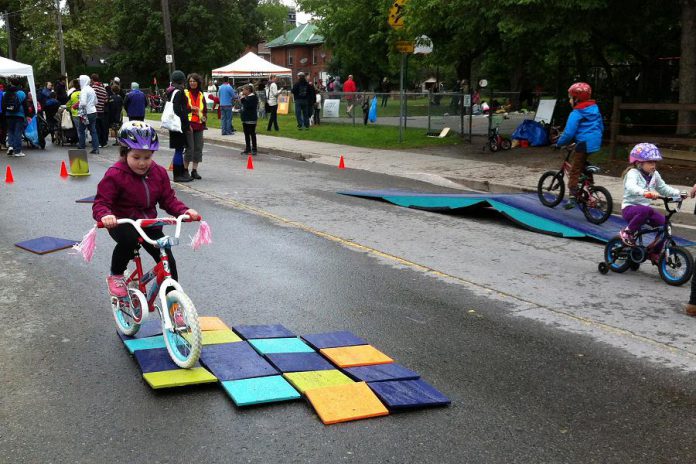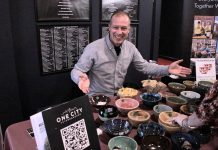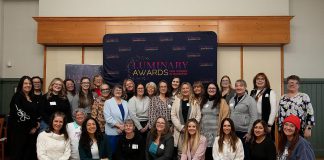
Fun Streets are community events that transform local residential roads into sites of play, active transportation, and recreation. Peterborough’s first Fun Street event took place on Stewart Street in May, and brought hundreds of people out into the road to celebrate their community and to engage in a number of fun and exciting activities.
The City’s second Fun Street event will take place this weekend in East City on Douro Street between Mark and Roger Streets.
This event will feature a bicycle playground, a portable skate park, a pop-up cycle track, circus arts, music, and a BBQ. The activities are all free, and the BBQ will be a fundraiser for the Major Pee-Wee AAA Petes hockey team. During the event, local traffic will be detoured to allow for the creation of a car-free play space.
Our streets are our city’s largest public spaces, but rather than being inclusive places for all people, streets across North America have been designed for people in cars.
Even on small, residential roads, people in cars are still considered primary, and children playing in the street are seen as guests who need to look out and move quickly when a car approaches. These are the kinds of streets we experience every day, whether in a car, on a bike, or on foot.
For those born after car ownership became common, these are the only kind of streets we’ve ever known, and they’ve shaped our expectations about where we are allowed and which space is ‘ours.’ But, streets can look different. Streets can be designed to prioritize people who are walking and cycling, or children who are playing. Streets can be designed as park-like spaces where people will want to sit and relax and where cars – while allowed – are treated more like visitors.
In the Netherlands following World War Two, the Dutch saw their streets transformed into places that prioritized people in cars. Roadway injuries and fatalities increased, and the number of children being killed by cars captured the attention of the Dutch people; they lobbied the government to design streets that were safe for the most vulnerable road users including children, pedestrians, and cyclists.
The Dutch also took action in their neighbourhoods to shift expectations about who was prioritized on local streets. On small residential roadways, people began moving their garbage cans and benches away from their houses and out into the street so that cars were required to travel slowly while weaving through them. After a period of time, this kind of intervention began to inform street design and streets called Woonerf, or ‘Home Streets’ became more common.
Home Streets are shared streets where equal priority is given to all modes. On these streets, traffic-calming features are built into the streetscape, recreational activities are encouraged, and cars often travel at the speed of a pedestrian in order to ensure safety for everyone.
While Home Streets are not common in North America, there is a movement that seeks to encourage active transportation and recreation on our streets. This movement is called Open Streets, and Peterborough had its first event in July of this year.
The event, called Peterborough Pulse, brought more than 4,000 people into the downtown core to walk, cycle, skateboard, or play along George Street.
Big events like Pulse help to showcase the diversity of uses that can take place on our streets and provide people with the opportunity to play on, and enjoy these public spaces.
Douro Street Fun Street is on Saturday, September 26th, between 10 a.m. and 2 p.m., rain or shine. See you there! Be sure to drop by and experience a Peterborough street in a whole new way.
For more information, please contact GreenUP’s Manager of Transportation and Urban Design Programmes, Brianna Salmon at brianna.salmon@greenup.on.ca.

























